#But subtext IS part of narrative
Text
Sex, Bugs and Drugs - Insect Aliens and The Winchesters
The Winchesters of course is a relatively PG show, we’d probably label it (thus far) “mild drug references” (to weed), “light kissing”, and “some horror”.
However, the fact it is inhabited by insect aliens (the Akrida) invites musing on other insect-alien narratives and their resonances within the show.
“This is Mugwump, he specialises in sexual ambivalence” (Cronenberg, Naked Lunch, 1991):

“We are all insects, groping towards something terrible or divine”
Phillip K. Dick The Man in the High Castle.
The prominent reference to Vonnegut’s Slaughterhouse Five in 1x01 Pilot, alerts us to the qualities of that narrative which may be relevant here; aliens (in Slaughterhouse Five, the Tralfamadorians), the impermanence of death (Tralfamadorians see space/time with non-linearity, in four dimensions, so just because you are dead at one point in time isn’t an “end of the road” moment for them) non-linear narrative, an unreliable narrator, the presence of the author/narrator in the story). All interesting resonances, regarding Narrator-Dean.
The aliens in The Winchesters, the “cricket” Akrida, are able to possess human bodies, seemingly shapeshifting to look like humans in doing so, and they mind-control humans by pushing a stinger into their brain-stem. This kind of insect mind-control/ body-horror/ body-penetration, really made me think about Cronenberg’s film Naked Lunch (1991).
Naked Lunch is based on William Burrough’s (1959) novel of that name (which is already semi-autobiographical) mixed in with events in Burrough’s own life. Burroughs of course, was a Beat Generation author, as well as being queer and a drug addict. His novel is very much not PG.
Cronenberg’s film captures Burrough’s atmosphere of queer desire mixed with self-loathing/ internalised homophobia, very well. Remember, Burroughs was writing in 1959; everyone queer had internalised homophobia, that’s why we needed to develop a Pride narrative for ourselves.
This queer desire/ queer horror is evident in the giant bug with a talking asshole on its back. It asks Bill, the main character (Burroughs’ avatar) to rub some of the yellow bug podwer on its “lips” (the rim of the asshole) and makes obscene noises of pleasure when Bill obliges:
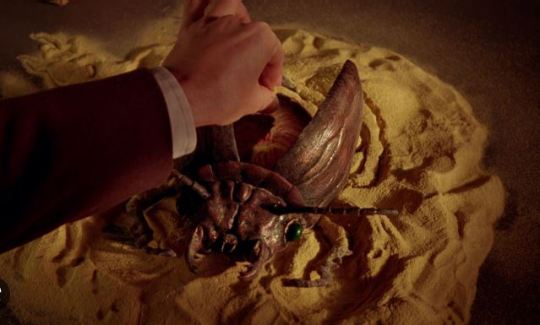
What the heck does that have to do with The Winchesters, you ask?
Well, in a much more PG way, we have the Ostium, which means, literally, “orifice in the human body”, the Men of Letters’ mystical box/ trans-dimensional portal which can blast the Akrida back to their alien home-world, and Carlos specifically joke-compares it to a sexual body “hole” in 1x07 Reflections:
Lata: “They call it the Ostium.”
Carlos: “Oh. Latin for an opening in the body. What, didn't any of you guys ever go to Sunday School? So is that thing organic? Is it a mouth or...( chuckles ) any other kind of hole?”
Lata: Let's just stick with a mouth, please.
https://tvshowtranscripts.ourboard.org/viewtopic.php?f=1550&t=58479
In Naked Lunch, the bug reappears, as a talking typewriter, and asks Bill to type the words “Homosexuality is the best all-around cover an agent ever had...” into it, and again, it makes obscene erotic noises of pleasure as he does so.

Bill reveals his own self-loathing/ ambivalence, telling another character he has a family “curse... I am a homosexual... impossible I am one of those simpering things... a wise old queen... told me I had a duty to live and bear witness..”
Later, as Bill makes out with a woman, a giant centipede alien with a long fleshy appendage (cock) and a human-looking butt slithers out of another typewriter and appears to join their love-making.
The Naked Lunch is a subterranean allusion in The Winchesters’ subtext. It’s not name-checked in the way Slaughterhouse -Five has been, which provides a clearer indication of authorial inter-textuality.
However, there are some interesting resonances; insect to human body-horror penetration (Akrida stinger into the brain-stem) a talking asshole/ a mystical “body hole” portal (the Ostium).
One more, being that in Burrough’s novel, and in Cronenberg’s film, much of the story takes place in “The Interzone”, which is partly an imaginary Morocco and partly Bill’s drug-fulled hallucinatory dream-world, but is, above all, a liminal space, which is symbolically representative of the space queer people in the 1950s inhabited, as “outlawed” subjects.
Narrator-Dean currently inhabits such liminal space himself, also in two senses:
1) We saw him die in 15x20, so he is, apparently, narrating from Heaven, or from the liminal space between dying and rebirth, as Holy Ghost Narrator Dean/ Dean’s soul in the Bardo (the space, as set out in The Tibetan Book of the Dead, between dying and reincarnation).
2) Dean continues to inhabit a liminal space with regard to his queerness in the SPN/ Winchesters narrative. He may be bisexual in a thousand ways in the narrative subtext, and in its (romantic) narrative architecture, but a heterosexual interpretation (they were best friends/ brothers) remains possible.
I bet Dean’s read The Naked Lunch.
#Supernatural#The Winchesters#The Winchesters meta#SPNWin 1x07#Reflections#The Naked Lunch#Holy Ghost Narrator Dean#Meta-textuality#The Akrida#Robbie Thompson#William Burroughs#David Cronenberg#Dean is bisexual#Still subtext#But subtext is part of narrative
57 notes
·
View notes
Text
I think what particularly annoys me with the "zelda was always gameplay before story" is that... it's not true? At least I don't think it's true in the way people mean it.
Zelda games were always kind of integrating story based on the standards of the time. When game stories were in game pamphlets, Zelda's stories was in the pamphlets. ALTTP tried to tell a pretty complicated stories with the limitations of the time. OoT was actively trying to tell an epic, cinematic tale packed with ambiance and expand what 3D could offer that 2D games struggled with. Majora's Mask is deeply character-driven in many, many ways. Wind Waker and Twilight Princess are both pretty concerned about their stories, down to the point that some people were bored by TP's cutscenes in particular. Skyward Sword, from what little I have played it, is very very invested in its characters and their journey (and 2D Zeldas have Link's Awakening, Minish Cap... None of them are visual novels, but they are concerned with emotional journeys, character arcs, mysteries about their own world...)
What is true is that the narrative wraps around the mechanics, and not the other way around. The mechanics drive themes, aesthetics, emotional beats and character journeys; and that's great. The world is a puzzle, and the world is delightfully absurd when it needs to be, full of heart when it calls for it, dark and oppressive when it suits the player experience.
That does not mean the games aren't invested in their stories. Even BotW has a pretty complicated story to tell about an entire world rather than one specific tale or legend --all of it at the service of the gameplay, which is exploration and mastery of your environment.
So. Yes, none of the Zelda games are million-words long visual novels that care deeply about consistency and nuance; but stories don't need consistency or deep lore to be meaningful and serve an emotional journey. Again: gameplay is story. The two cannot be so easily parsed from each other.
And Zelda as a franchise obviously care deeply about story, characters and setting (and still does right now --otherwise there wouldn't be a movie), even if it doesn't try to imitate prestige narrative-driven games, which is great and part of why I love this series so much. Doesn't mean it couldn't have done better in the past, it obviously could have, but I feel like pretending that nobody ever cared about story or character is just... false? It's a huge disservice to the devs too. Some of them obviously cared immensely.
The "gameplay above story", at least in the extent to which it is paraded today to defend TotK, mostly, is a really recent development. And I think it's one that deserves to receive some pushback.
#thoughts#tloz#zelda#the legend of zelda#totk critical#(sort of)#(I mean this is the subtext)#guys in 1998 nintendo was trying its darnest to make an epic story (with uhhh the writing that it got)#(love that game to bits but won't defend the actual writing)#the fully gameplay-driven game was mario 64!!!#I think this perception is also partially the fault of that “narrative game” category that is just.... kind of like Prestige TV but for gam#as if most games don't have some form of storytelling within them#and that coherence and vision and consistency are part of game design too#and will hurt a game's enjoyment if not handled correctly#a really really paired back narrative game is really difficult to pull off actually!#because you still need stakes and some degree of intrigue#so you need to figure out how to introduce this without walls of text and is it narrative design? is it game design? it's both!!#anyway anyway
443 notes
·
View notes
Text
actually you know what if you make will's dad an abusive parent i cant say i trust you much
#maybe this is controversial maybe its not#but i am TIRED of this interpretation of will's dad being some crazy abusive alcoholic who made will's childhood miserable#it doesnt make much sense and its that same thing i have with ppls interpretation of certain dc characters and their skin color#like. tell me WHY you think will's dad was/is abusive toward him. tell me about how you imagine will's childhood#and WHY you imagine it that way#is it bc will grew up poor? is it bc of some 'white-trash' southern stereotype you have in your head?#like tell me honestly and frankly bc otherwise i cant understand the choice to make his dad that way#i will fight tooth and nail to defend the good-will-dad hc bc the inverse of that makes me mad#giving will some 'tragic' backstory that involves parental abuse is in no way the compelling narrative you think it is#it actually detracts so much from will's character bc the POINT of his becoming is that he has ALWAYS been this way#nothing MADE will the way he is and the show literally follows will slow acceptance of that part of him#he's not 'dark' bc of some abusive childhood. that's not the connection we need to be making here and inserting this#cruel disparaging narrative that will's dad abused him with the only subtext being they were POOR is so fucked up#will graham
3 notes
·
View notes
Note
Hey so I picked up if we were villains on your recommendation and am loving the Shakespeare structure and references. I have been getting "disaster bi" vibes from the protagonist since act one but I'm halfway through and haven't seen the signs of a turn coming in his relationships. Does the book get gayer? Or is it all in my head?
oh, hey! well, i am glad you're enjoying it so far! oliver is *definitely* a disaster bi with a lot of internalised issues and a glaring blindspot in self-reflection. idk if you've read my (very short) goodreads review for this book, but i think what's essential to this story is the simmering potential haunting the text in every aspect. you have characters, relationship dynamics, plot points, mysteries, class dynamics, etc. (even shakespeare's texts) haunting the narrative—mostly metaphorically but in connection to the big "who-done-it" even literally. the subtext is definitely what gives the text its meaning and creates palpable tensions in all aspects of the narrative. in the end it all boils down to a myriad of "what-ifs" that ignite and fuel your engagement with the text.
so, does the book get gayer after the halfway point? kind of, but also kind of not. it's very hard to give a clear answer because the appeal of the story is based on the elusive nature of the text as a whole. that doesn't mean that some things are not more explicitly expressed further down the line. it just means that the story skilfully uses potential and ambiguity (i.e. "what-ifs") to build narrative & emotional momentum. if you get the feeling there is *something* there, then there's probably something there. the story definitely asks you to pay attention and pick up on hints and cues before presenting you with any revelations—it's kind of its charm, i think. so, is it all in your head? no. no, it's definitely not all in your head. but i am sure you'll get what i mean once you've finished the book....
#just thinking about the ending drives me to the brink of insanity#it was one of those endings that i NEEDED to talk about or i would have lost my mind#so if you need to talk about it at some point i am happy to listen and if necessary add my two cents#like as a former lit major i'd LOVE to write an essay about this book istg#it's just perfect for that bc there's so much subtext and ambiguity and narrative potential that remains—in parts—unrealised#i am so so sorry if i am boring you with this lmao#i also tried to avoid going into further detail about the relationship you're hinting at so as not to spoil others#but pls know my dms are always open#anyway have a lovely day#answer#if we were villains
12 notes
·
View notes
Text
sorry for being insane about this play that genuinely 0 people care abt but what i would give for an explicitly queer interpretation of this ohh my god


anyway i cannot in good faith recommend this to everyone bc i know some people will find it boring but uhhh you should read it anyway. also i made a playlist ://
#it’s abt the one person who you know in the world who is Like You leaving#it’s about idealism and dissolution and trying so hard in the face of certain denial#anyway i think andrey fell in love with him and that’s not why he left but it’s part of why he needed to#i wouldn’t even call anything in this play subtext but that being said#there Is no part of the text that contradicts it and i think that it is a stronger narrative as a gay love story#so i’m right <3#also for the record bc i like you is not the confession but whether i am dead or not kind of is#ted talks#a walk in the woods
8 notes
·
View notes
Text
it drives me bonkers the way people don't know how to read classic books in context anymore. i just read a review of the picture of dorian gray that said "it pains me that the homosexual subtext is just that, a subtext, rather than a fully explored part of the narrative." and now i fully want to put my head through a table. first of all, we are so lucky in the 21st century to have an entire category of books that are able to loudly and lovingly declare their queerness that we've become blind to the idea that queerness can exist in a different language than our contemporary mode of communication. second it IS a fully explored part of the narrative! dorian gray IS a textually queer story, even removed from the context of its writing. it's the story of toxic queer relationships and attraction and dangerous scandals and the intertwining of late 19th century "uranianism" and misogyny. second of all, i'm sorry that oscar wilde didn't include 15k words of graphic gay sex with ao3-style tags in his 1890 novel that was literally used to convict him of indecent behaviour. get well soon, i guess...
#the picture of dorian gray#lit#this is a pointless text post#guess what i read for the first time in the year of our lord 2023#and yes this is a real review on storygraph that i took a screenshot of. you people are so stupid god bless#girl he literally censored it himself did your edition have 0 introduction or background at all#greatest (s)hits#book discourse
68K notes
·
View notes
Text
I used to get insecure when reading radical critiques of "born this way" narratives, but I understand it differently now. I'm reading early defenses of homosexuals that concede that their "invert" pathology is worthy of sympathy, and that straight society ought to allow them to have sex (in the right circumstances) so they don't have to be miserable. They go on to claim that while some people who commit homosexual acts are victims of their circumstances, the real perverts are ontologically straight men who commit them by choice.
If I asked every LGBT person I know, "did you choose to be queer," virtually everyone would say no. I have never, to my knowledge, met anyone who would say yes. But if I asked them if they would turn straight/cis if they could, I believe that most, including people who have gone through great hardships on account of their identities, would still say no. The phrase "gay lifestyle" is considered politically incorrect, and indeed there is no one gay lifestyle. But we have also developed culturally distinct circles associated with pleasure as a virtue, creativity, individual dignity and collective care. Many of us learned to look at the straight world not with envy but with relief that we're not part of it.
There are characteristics of our queer identities or behaviors that are a choice. I did not choose to be attracted to men, but I did choose to be promiscuous. I did not choose to be uncomfortable with "male" gender roles, but I did choose to challenge them through gender expression. An emphasis on innateness would imply that the only characteristics of my identity and behavior worth defending are those that are inevitable. It would ask why I still insist on living the way I do when my sexual desires can now just as well be satiated in a legally recognized monogamous marriage.
The subtext of this question, a choice or not a choice, is whether a person is worthy of support. Much like the elusive "gay gene," some trans advocates are searching for the definitive proof of "male brains" and "female brains" that will validate the existence of trans people once and for all. If gender becomes medically or scientifically "provable," perhaps science would then validate trans people. Or, perhaps a brain scan would determine who should or should not consider themselves trans, and create new rationalizations to misgender on "scientific" terms. We need only look back to the sexologists of the late 19th and early 20th century, often gay themselves, who developed scientific rationalizations for queer behavior in good faith only to have them reapplied to nefarious ends.
Many will insist they support LGBT people in the abstract but not the specifics of queer culture. These are the tendencies that don't have a scientific or metaphysical explanation. It is less often we hear claims that one is born to be flamboyant, promiscuous, left wing, kinky or polyamorous, so these tendencies are superfluous. There is a platonic ideal of a lesbian, a gay man, a bisexual or a trans person who follows their natural proclivities and not a step further, and you're not it. So arguments against born this way narratives are not just in defense of those who see themselves as having chosen their gender or sexuality--for what it's worth, I have not knowingly met any. It's that this is a flimsy claim to legitimacy, one that has been used against us, and one that can only be taken so far. I'm not interested in determining who is "faking it." I understand more and more that everyone's body belongs to them, and the steps they take to experience joy and mutual pleasure need no explanation.
2K notes
·
View notes
Text
After all these years, ‘I Remember You’ is still one of the great highlights of Adventure Time Storytelling. And not just in the basic ‘what???? Silly children’s cartoon does something SAD??? HOLY SHIT MIND BLOWN’ way. But with the execution of that Something Sad. How it manages to pack so many Complex Emotions into just 11-minutes of television. And especially the way it utilizes the basic Adventure Time format for that purpose.
So Adventure Time is a Board-based show. Each episode has an outline pitched and written down by the writer’s room, and then this outline goes to a team of (usually) two Storyboard Artists who develop that simple outline into a full story. And with the show’s art-style deliberately eschewing staying perfectly ‘on-model’ in favor of having the animators take direct reference from how the different storyboarders draw the characters
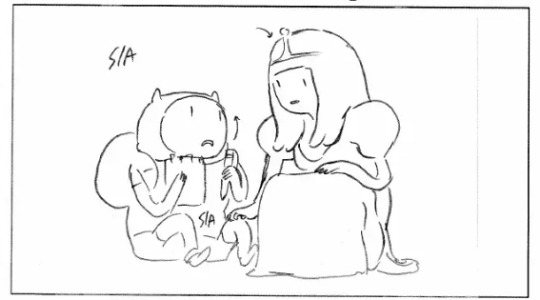

And the show being generally extremely versatile in terms of themes and tone - AT has allowed a lot of their Storyboarders to really express themselves and their unique artistic vision as part of the Big Collaborative Narrative that is Adventure Time.
Now, the Boarders who worked on ‘I Remember You’ are Cole Sanchez and Rebecca Sugar. These two were a Storyboarding Duo from the start of S4 and until Sugar left the AT Crew during S5, and they always struck me as a curious combination. I think really from all of the individual boarders working on AT during that time, these two really are the closest to having like… Totally Opposite Artistic Sensibilities as boarders.
With Sugar favoring a style that is very loose and sketchy and also very rounded. Focusing on expressions and subtle body language and lighting. And being famous for going deep in depth into Big Moments of Emotional Catharsis
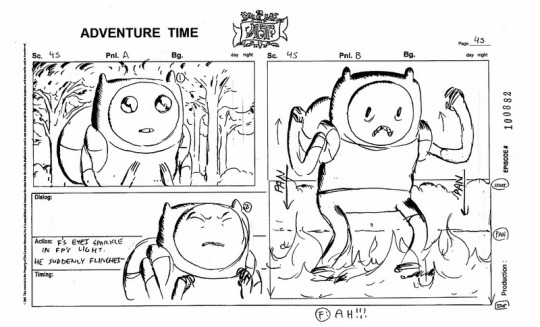
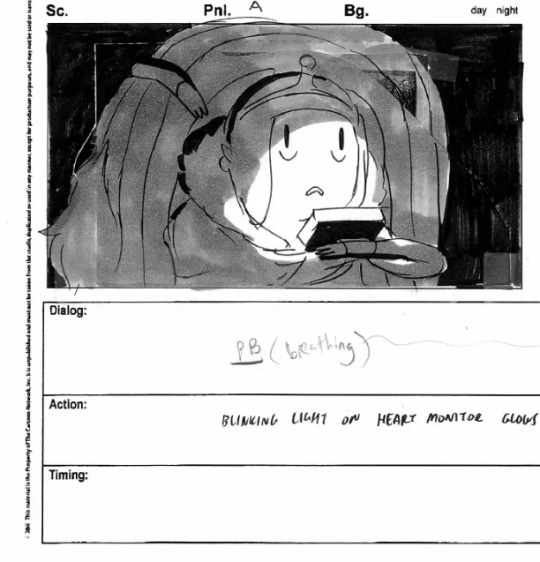

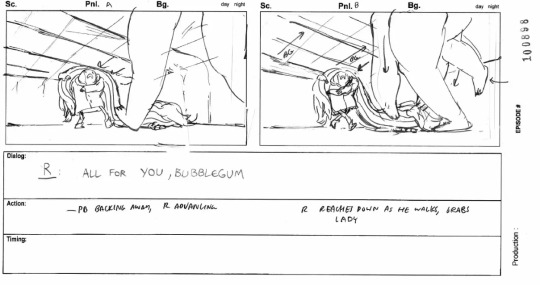
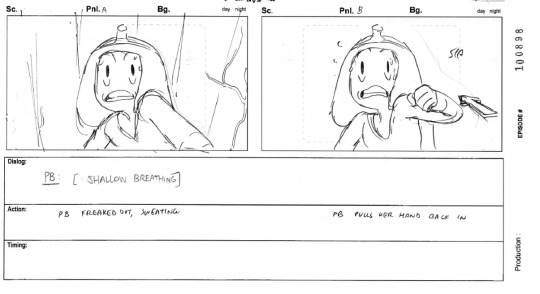
And Sanchez having a very clear art style that emphasizes strong silhouettes and clear lines that suggest flatness. Focusing more on major poses and the character’s positions in the space. And having just a really great eye for AT’s brand of silly humor.

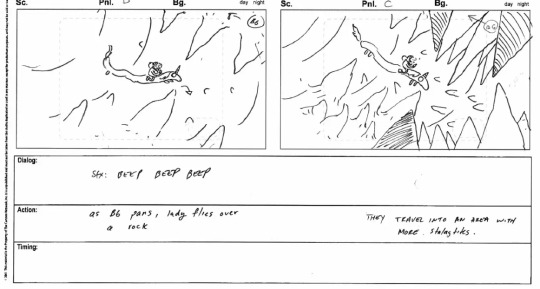

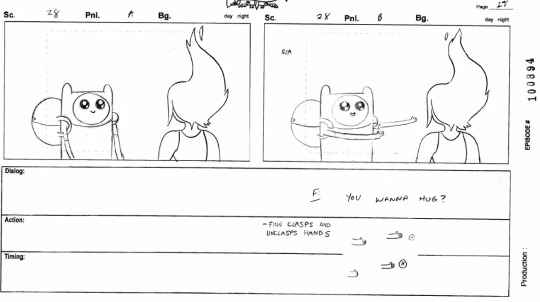

Like, I almost kinda suspect these two were paired together so they can each cover for the other’s “weakspots” in writing ‘Adventure Time’.
And there were a few episodes that did some really interesting stuff with this very contrasting pair - ‘Jake the Dog’ is another example. Giving most of the Farmworld scenes to Sugar and most of the Time Room scenes to Sanchez both plays to their personal strengths as storyboarders and helps to emphasize the strong emotional contrast between these two scenarios.
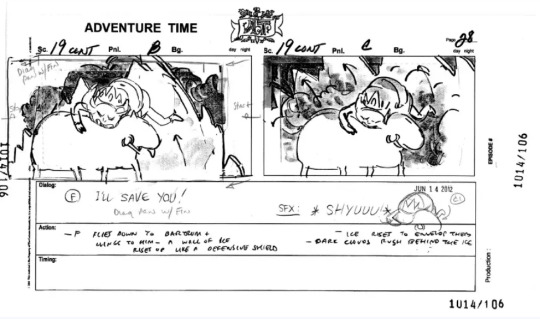
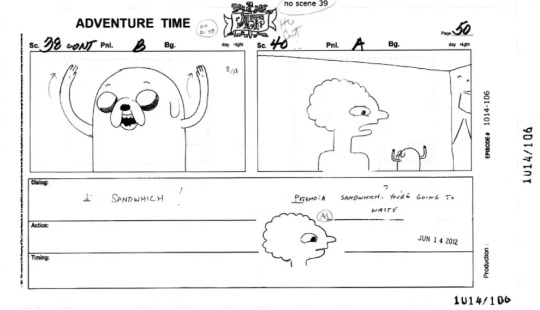
And ‘I Remember You’ is actually kinda unique among Adventure Time episodes cause… Most episodes will have the two boarders alternate between working on the episode throughout it. Like you’d have Boarder A draw a bit and then Boarder B and then Boarder A again… But “I Remember You” is divided between Sanchez and Sugar… basically perfectly in the middle.
So the entirety of the first half of the episode was boarded by Sanchez




Until Ice King pushes Marceline and then leaves the room in shame.
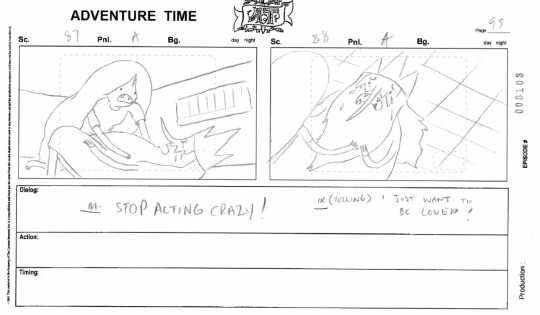

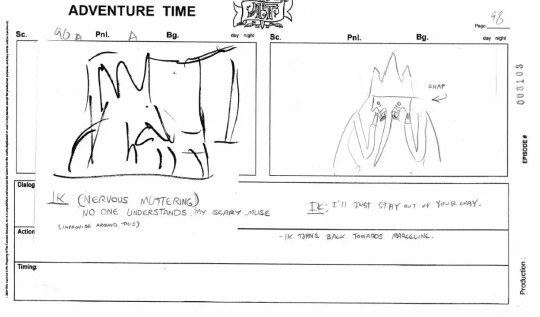
And then, Sugar takes over.

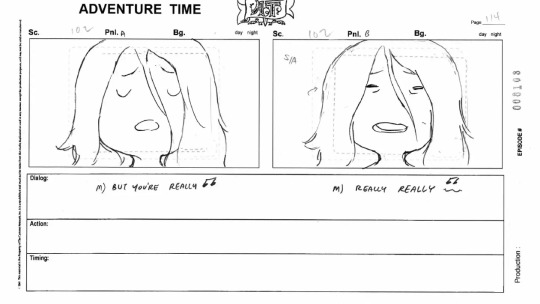
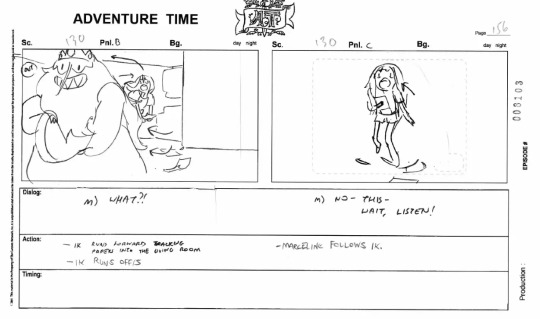
And, like, even if you don’t know anything about the Behind the Scenes of Adventure Time or who Cole Sanchez and Rebecca Sugar even are - the Shift is noticeable. The shift in tone, in narrative focus, in the subtleties in which the characters are drawn.

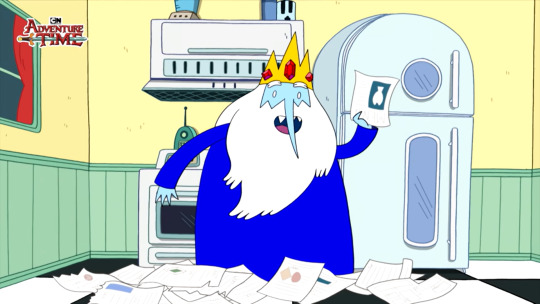
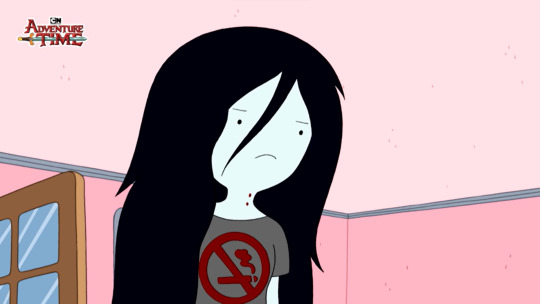
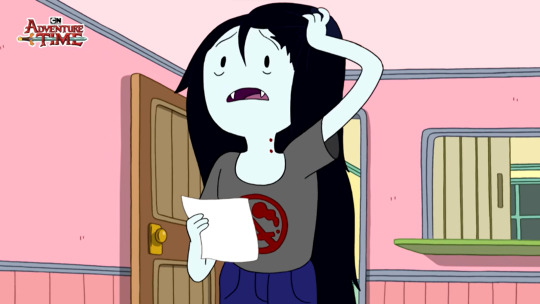
The entire first half of the episode has this thin veneer of just being a Silly Goofy Ice King Episode. Sanchez’s talent for Adventure Time’s brand of comedy is on full display… but there is also this underlying feeling that Something is Happening just under the surface. And these hints of the Big Emotions of ‘IRY’ expressed via Sanchez’s kinda goofy style really create this balance between putting the audience into a false sense of security that this is just a Very Normal Episode about two characters hanging out and the Tension constantly brewing in the subtext.
And then it all comes to a blow.
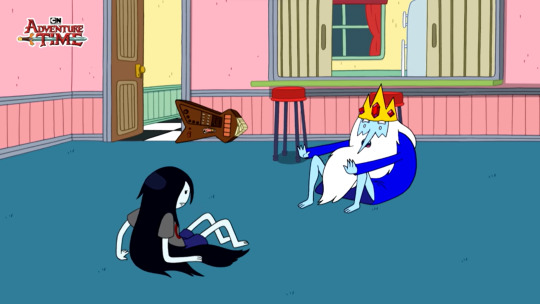
And then the Shift happens. And now we are in Sugar’s court.
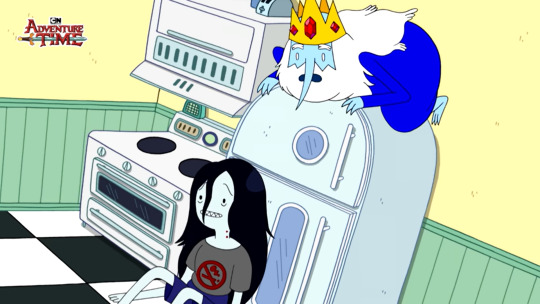
And this subtle shift in the artstyle and storytelling also coincide with Marceline finally openly expressing her feelings and the Reveal of Simon and Marcy's shared past. The episode changes focus from Ice King's silly antics to Marceline's feelings. Everything changes, everything in the first part of the episode gets recontextualized and... even on the most basic level, the episode is now Noticeably Different.
I would almost say that Sanchez’s half of the episode has Ice King define the tone, while Sugar’s half of the episode has Marceline define the tone. But more than anything it’s the catharsis. The reveal and release of those emotions that were building up so expertly through the Sanchez half of the episode. All of the Sugar-boarded scenes in this episode are really heartbreaking on their own, just through the tragedy of the story and Sugar’s expert knowledge of howto convey emotion in the visual medium - but it’s so enchanted by what came before it.
“I Remember You” is truly a great testament to how ‘Adventure Time’ could use every aspect of its medium to tell a great story in such a short time.
#adventure time#at#atimers#adventure time analysis#i remember you#rebecca sugar#Cole Sanchez#storyboard#ice king#simon petrikov#simon and marcy#the ice king#marceline#marceline the vampire queen#marceline abadeer#at ice king#at simon#adventure time ice king#adventure time simon#ice king adventure time#simon adventure time#simon at#marceline adventure time#at marceline#adventure time marceline#marceline at
510 notes
·
View notes
Text
it's pretty implied that ellie never came out to joel in the proper sense. she lets him assume that she's into men, gives him the false satisfaction of "seeing" her "crush" on jesse, does not correct him. she's fairly confident in being gay in public for others to see and having others close to her know; so why not correct him? why dodge the topic?
was it out of fear? could it be that she never broached the topic despite being close to him in the early years because of the possibility of his reaction being negative? that she was afraid that out of all things that could force them apart (further apart after they split), him reacting badly to her being gay would be the worst?
what about at the dance? would she have been as wound up as she was if the moment hadn't been an encounter with a vicious homophobe? maybe she would've still snapped without this context, but why is she immediately on the defensive against joel after he sticks up for her?
what about the porch scene? why did she refute his question of dina being her girlfriend so insecurely, looking away, nervously and quietly stumbling over words? why isn't she mean about it? why doesn't she get defensive at the question? why did she lash out again when he expressed acceptance?
i think these scenes revolving around her queerness indicate it as such; that ellie never told joel for fear of a response, that she lets him think what he wants because that's the easiest way for it to be. then, when she's ready to face off against a homophobe, because that's the way things are, that's what she can expect, and joel defends her, she lashes out.
it's such a clear juxtaposition of support and hatred between joel and seth, and being faced with joel's acceptance is too much, makes her turn to the anger she'd been holding onto and reinforce what she thinks is true -- that she doesn't need him. and in the fallout, as her regret dawns on her, so too does the realization; he was protecting her, like always, without hesitation, over this thing she was always afraid he wouldn't accept her for.
in the porch scene, joel chooses his words wisely, and asks if dina is her girlfriend -- not "so you're gay?" or "why did you never tell me?" or "how long has this been a thing?" -- with such a casuality that it seems to throw her off. it's like ellie can hardly get the words out. she refutes the idea, fumbles for each following part of her response, is tense. she wasn't prepared for the question.
and when he finally asserts his support for her, in as explicit terms as he can, you can see ellie become emotional, touched for a moment but overcome, before she launches into the defensive again, exactly like at the dance scene -- meeting his kindness with hostility as a way to cope with her emotions.
and then, in response to her basically saying her life doesn't matter, he affirms that it does.
so he's now affirmed two things that ellie has doubted: that he accepts her being a lesbian, and that her life matters. a conflation of the two, in ellie's mind, may have come after; and after that, her olive branch.
and yeah, him affirming these things for her is fully in the context of his overwhelming parental love for her and her complex feelings about being the cure, but within a queer subtext, it means more. it's such a familiar thing to slink around loved ones and hide being gay/queer for fear of any type of response, and lying by omission in conversation just to keep that state of peace, of normalcy. ellie, with all her brutishness and bravery, falls into it like anyone else, because even while mad at him, she valued that response from him.
a lot of people seem to think that the approach to ellie's queerness is nonchalant, that it's just some unrelated thing about her, but i think that it holds more weight in the narrative that what is explicitly spelled out. it's subtle but it was a deliberate choice to place her queerness at the center of the confrontation. i think that's why ellie's relationship with dina took center stage in the story, and why so much time is devoted to just them -- because her being queer matters to her character, but in a way that perhaps only a queer person can see, analyze, and appreciate (without being blatant enough to anger certain other fans).
#i've been re-evaluating my long-conflicting feelings on the concept of coming out#tlou#the last of us#tlou2#the last of us part 2#this isn't an internet breaking take#i'm sure someone has said this before#but i'm just...thinking.#the meta of us#talkies#ellie williams#joel miller
533 notes
·
View notes
Note
Wow. Whoever is in charge of Netfix' Avatar doesn't remotely understand Avatar. No, that's too generous. They seem to be failing Writing 101. As in basic character arcs, narrative progression, flaw being the catalysts for self-discovery and character development, layers of character expression that are not explicitly spewed out or as it is sometimes is called 'subtext' and 'depth'. Like... I don't get it. If they gonna strip the show down even more, all they are going to be left with are bare bones of logistics. Characters A, B and C traveled from Location 4 to Location 6. Riveting. /s
The worst part is something else, thou. It is this quote: "that’s part of the process of going from a Nickelodeon cartoon to a Netflix serialized drama" as in 'cartoons are not real drama, it's simplistic and for children'. It's the same high horse, patronizing stuff Halo TV Show showrunners have said. Basically meaning that games are not real cinema or real art. It all reeks of snobbism and faking humility.
Saw this yesterday and it’s just a fucking giant red flag. Game of Thrones has done so much damage to creating fantasy media.

The gang won’t go on as many detours to go ride elephant koi - great, I’m so desperate for the world of avatar to be depicted in the most dark, depressing way possible.
I don’t remember anyone begging for another live-action avatar. Once was bad enough, so a lot of the excuses of “Yeah we had to make changes for live-action” immediately makes me say “Well, you didn’t need to make it live-action at all.”
626 notes
·
View notes
Text
I have many goals with Thralls, but my main two are :
Make a convincing case for Ganondorf as the unhinged but incredibly charismatic leader of a rebellion movement whose best and worst quality is to be absolutely brutal as a war strategist --which secures short-term wins and reputation by pulling off crazy gambles and doing the warlord shtick of sending messages through spectacle, but cannot keep a movement together to save his life (literally rip) because he absolutely fails to identify and compensate for the emotional toll that kind of strategy takes on his troops, and the fact that not everybody agrees with neither the ends nor the means used to justify them. He runs his army with hyperfocus on short-term goals and handwaves the rest with hype factor, basically. That may win a battle, even a war! But if you can't convincingly sell what peace will look like under you, then the cost paid to get there may start to look a little steep for some.
Make a convincing case for Impa as simultaneously the worst and the best person in Hyrule; someone who has SO MUCH blood on her hands she barely manages to understand herself as a living person anymore, and her moral compass has been so completely shattered that she has forgotten she has not only the duty, but the right to draw moral limits for herself and to have beliefs about herself and others instead of being that stone-cold pillar to support every hylian that flail with guilt and self-righteousness around her, but also: her love and attachement for Zelda does remain her path to some form of redemption in spite of the many ways it chains her down --partially because she loves Zelda too much to let her become the worst version of herself, and Zelda loves Impa too genuinely not to question her role in her life, and the many perspectives she does not have on the events that shaped her.
I am. Excited about this story. In spite of the Horrors. ;;
#thoughts#thralls of power#animatic project#ganondorf#zelda#impa#the current Horros being: sooo many frames#also third goal: make a convincing case that you can be a demure petite woman and still objectify big scary men in several different ways#because there are other kinds of power than brute force#and that your own trauma and objectification doesn't prevent you from being a monster in your own right because you are desperate#to make sense of yourself and understand your role in a terrifying world#that never allowed you to exist without men to contextualize you as a part of their narrative#(aka: Serielle will be a Tough Sell but I'm trying to be confident about it)#(especially since it's (almost) all in the subtext and power dynamics and stuff)#(but anyway it doesn't happen right now anyway)
17 notes
·
View notes
Text
The text and subtext of Conrad being gay and living his life through his art and Schubert being possibly bisexual and living through his art in a fantasy world and Jones being gay and having his heart broken every single night on stage which ultimately leads to his heart being broken in reality at Conrad’s death, there’s something about being an artist and being consumed by your work but also simultaneously about having a life where you’re too scared of the repercussions of what you want. The parts of the movie in color as the play itself and then the black and white as the context and textual subtext behind a queer reading of the narrative.
#asteroid city#asteroid city spoilers#Jason Schwartzman#Wes Anderson#Augie steenbeck#Conrad Earp#Schubert green
1K notes
·
View notes
Text
STORIES TELLING: THE BREATHTAKING EFFICIENCY OF WRITING IN OUR FLAG MEANS DEATH
One of the things I most admire about Our Flag Means Death is the efficiency of the writing. So much happens so fast, but nothing is dissonant or feels like it comes out from left field. I think part of the reason it works so well is that the subtext does a lot of heavy lifting; setting the foundation for what comes next. There is always more than one thing being conveyed. It isn’t simply storytelling, it’s stories telling.
Case in point: Ed's stories about underwater beasties...
S1 E6, The Art of Fuckery - Ed telling the crew a story about the Kraken.
S2 E5, The Curse of the Seafaring Life - Ed telling Stede a story about fishing.



S1 E6 Young Ed sees the kraken (himself). It’s foreboding, powerful and uncontrollable.
S2 E5 Ed clearly delineates between himself and the beast (rage, violence, protection). He is the man (an adult, above the water), conscious and in control. The beast is beneath the sea (subconscious).

S1 E6 Ed describes the kraken as hideous, rising out of the water (of its own volition) while young Ed stands nearby, powerless.
S2 E5 Ed describes pulling to bring the beast out of the water. This is a conscious act, over which he has control.

S1 E6 Ed describes the kraken attacking, before Ed even knew it had done so.
S2 E5 Ed describes triumphantly pulling the beast from the water.

S1 E6 Ed describes his warning about the kraken coming too late, and the kraken takes its victim. The kraken is in control.
S2 E5 Ed shows Stede the beast he subdued: a small fish.
Why is this so damn heartbreaking and funny and touching?
We have two stories that are highly entertaining and work within the context of the episodes to move the narrative forward. But they also say a whole lot about how Ed sees himself at each moment in time.
In season 1, the beast is safely underwater, but it can always rise, with overwhelming strength and power, to wreak havoc and keep Ed safe. It’s not something Ed is fully in control of, and it can (and later does) do tremendous damage.
In season 2, episode 5, the beast is safely underwater. Ed has to put effort into keeping the beast on the line and reeling it in, but he is in control of it.
And, while the small fish silhouetted triumphantly against the moonlight is beautifully sweet and funny, what made me crumple on the floor is what it says about how Ed is beginning to manage the kraken (himself) now.
The kraken is still there, under the water, and maybe Ed isn’t ready to control it in its full form, but he’s working on it. He wrangled a small sea (subconscious) beast and is celebrating his success in that.
And then Stede says this:
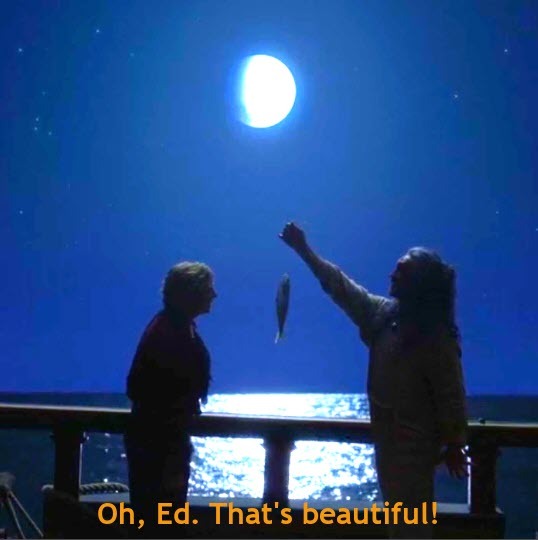
(Sob. You're such a good boyfriend right now, Stede!)
Yeah, Ed. That is really beautiful. Good on you, mate. Keep going.
This post was written before OFMD season 2 fully airs. No idea what’s going to happen in episodes 6, 7, and 8 (and I’ve generally fled social media to avoid spoilers). I’ll be back, looking at everyone’s fascinating posts after the finale airs.
#JFC the OFMD writers have game#OFMD parallels#OFMD subtext#OFMD meta#The kraken#The beast#Fishing#Edward Teach#Stede Bonnet#Our flag means death#OFMD S1#OFMD S2#OFMD S2 E1-5 spoilers
418 notes
·
View notes
Note
Can you recommend fanfiction that you personally really like?
Yes! Love this ask. I’ve never made a Zutara fic rec list partially because I’ve read so many wonderful stories over time that I find the prospect daunting!
But there are absolutely certain stories that I have a personal soft spot for, that I return to again and again. And that’s my criteria for what’s included below. This is a sampling of fics that I find myself coming back to, in no particular order. I may come back and add more, because this list is so far from exhaustive. A mix of ratings (marked), so keep that in mind.
Wish I Was the Moon by Like a Dove (T), post-canon: There’s so much that I love about the way this one-shot explores Katara’s character and what she faces post-canon, how she frees herself, strikes out in the world and finds her way home. Her feelings for Zuko, and her inner-conflict around them, are rendered tangibly, both through scene and subtext. A really good example of how an author can show a character’s lack of/journey to self-knowledge without breaking voice.
Refraction by caroes3725 (E), post-canon: When I started reading Zutara fanfic (for me this was in 2020), this was the fic I was looking for—a deep, realistic-to-canon, in-character exploration of how Zutara could unfold after the events of ATLA in a way that gives Katara in particular the arc she deserves. Really well-done development of the Fire Nation court world, well-developed characters, shining dialogue. An amazingly well-worth-it slow burn.
Wildfire by rainstormdragon (E), post-canon: To me this story is kind of a steamy Zutara thesis. The characters are so spot on and alive, their flaws are on full display in a way that feels realistic, and their chemistry is powered by their compatibility—matched in passion and stubbornness, and also in what they want from life. And I think it really gets Aang, too, which is something that can be hard to find in ZK fic. Also really hot, but that's only part of what makes it really shine.
Partners in Learning by evergreenonthehorizon (T), Modern AU: One of the things I love in modern AUs is watching an author weave that invisible string between these characters. Sometimes, it’s by writing narrative arcs that parallel the series, and sometimes it’s by drawing out the personality traits that make the characters both lovable to readers and such a compelling match and watching that spark bloom into flame. This beautifully written story does that so, so well in a really compelling Modern AU setting. Zuko and Katara here are so wonderfully lovable, and it’s a joy to watch them fall for one another, too.
Journeys by Smediterranea (E), Modern AU: In real life, I want to see my friends in relationships with people who can recognize why they’re so particularly amazing. That potential, I think, part of the appeal of ZK as a ship, and that’s part of the special magic of this fic. Watching these two characters get to know one another—really see one another—and fall in love deliciously sweeps the reader up. Plus, really fun, in character cameos from the rest of the Gaang along the way.
Spark, set fire by marijayne (T), Modern AU: literary fanfic, and I mean that in the best way. This story is beautiful and bittersweet, the latter is not often something I seek out in fanfic (where I hide from life), but here it’s gorgeous and worth it. The world building here is really cool—allows the author to explore some of a set of cultural issues/interactions that both echo the ATLA world and ours. The characters are so tenderly drawn (dadko especially)—and the connection between them builds beautifully and tangibly—and the longing is…chef’s kiss.
Wrong when it's right by nire (T), Book 1 Canon Divergence: Before I read this, I couldn't imagine wanting to read a Book 1 Zutara. After, I wanted more. Bickering, bed-roll sharing, shared heat, tenderness and common ground. A delight from start to finish.
Anyway, thanks for asking and happy reading! <3 And if you want more recs, let me know.
247 notes
·
View notes
Text
Tolkien said that one of the things he didn't like about LotR was that the book was too short.
In a way I agree with him, because I found the ending so rushed [others always say "that evil" is destroyed in the middle of the book and everything after is just an long epilogue] and yet I found it rushed. And I wanted a lot of the appendices to be narrated chapters, it was interesting to see what the lives of each member of the Fellowship were like in the appendices, but I wanted chapters about.
And I would also like to have seen, narrated chapters, of the Battle of Dale, with Brand (Son of Bain, son of Bard) and Dáin fighting three days against enemy armies and dying. I wish had read a narrative of Thranduill and Celeborn uniting in Mirkwood and destroying Dul Guldur once and for all, and then dividing the region between them.
When LotR informs that the others would not come to battle because they already had war at their gates, I wanted the plot to split to show this in other parts.
A better development of the romance between some characters would also be interesting, the Tale of Aragorn and Arwen already makes me cry every time I read it, but I feel like it would be more interesting as a narrative than an appendix. If their marriage went on for another 100 pages I wouldn't mind. And I would like Arwen and Elrond's conversations not to be just subtext.
Faramir and Éowyn, I really love them as a couple, but I think more pages dedicated to their romance would also be interesting. Sam and Rose? I would have liked it more if we had more mentions of the girl throughout the journey, if Sam mentioned her more often throughout the plot, so maybe the end wouldn't seem so sudden.
When I say that don't like the development of the "love pairings" in LotR, it's not that I don't like the characters or the ships, but that the narrative wasn't enough for me.
Don't get me wrong, I love LotR. But I wanted there to be more to be "narrated" than "told" or "implied" or "pointed out in the appendices."
Yes, I also thought the book was too short.
There is a lot between the lines that could come to light more. It could have been another thousand pages. And perhaps it still wasn't enough. How could anyone think that LotR is a very long book?
Maybe that's the problem with Tolkien creating such a complex Universe with such interesting characters: no matter how long the book was, it would never be enough. Because as a fan, I would always want more and more of it. More immersion at all points.
Is it always like this with authors who create universes that seem so incredible to read? And when it's gone, it's not enough to fill the void.
And all the posthumous books, like The Silmarillion, or Unfinished Tales (and others), with the tone of "organized drafts" and "told" instead of narrated most of the time, weren't enough for me. I still wanted so much more. And I never will have it.
Don't get me wrong, I liked the posthumous books, I think Christopher Tolkien did a good work. But still, when reading, I always asked myself "if this had been published by Tolkien during his lifetime, would it have been like this? What would he have changed yet? What would he have more refined?".
Because, as much as other fans like to see posthumous books as a "canonical" part of the work, like complements. I can only see as unfinished drafts, which it truly are. No matter how well organized are, even The Silmarillion is just a draft organized in the best way, Christopher T says this.
The letters don't count for me either, because Tolkien changed his mind about several things, just like in the drafts.
So I feel that, although the Tolkien Universe is vast, there are a lot of drafts and letters, and little work is actually completed.
I liked the posthumous books and the fact that they expanded the universe even further and provided more information. But it becomes a “vicious cycle”, as the information contained there also brings more desire for it be narrated by Tolkien himself in an book he finished (but will never be! Unfortunately).
And that saddens me. Because I wanted so much more. And Tolkien didn't live long enough to give it. In the end, it's a mix of happiness for what Tolkien gave, and sadness for what he still could have given.
#lord of the rings#lotr#the fellowship of the ring#the return of the king#tolkien books#eowyn#faramir#aragorn#arwen#elrond#thranduil#celeborn#the silmarillion#unfinished tales#the hobbit
240 notes
·
View notes
Text
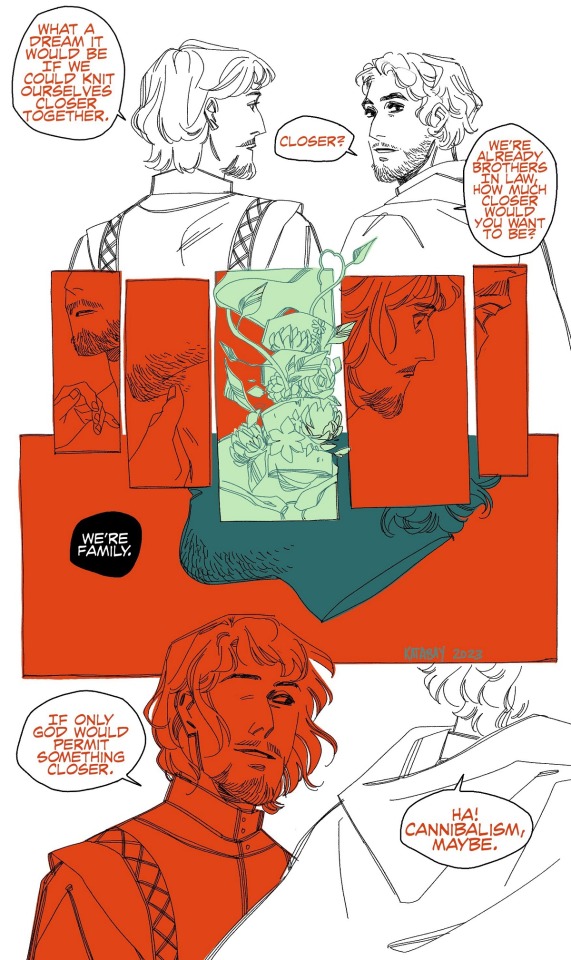
THE SHERIFF AND GUY OF GISBORNE
uh. try to stay with me for a second. so incest motifs are a huge part of medieval lit. you see it in arthuriana cycles, you see it in romances, it's a whole thing.


Incest and the Medieval Imagination, Elizabeth Archibald
so robin hood. both adaptions and the text itself, tend to get interesting with guy of gisborne. and I will say that while I found the media being discussed in this text absolutely fucking insufferable to watch, the discussion on it was delicious, impeccable, show stopping

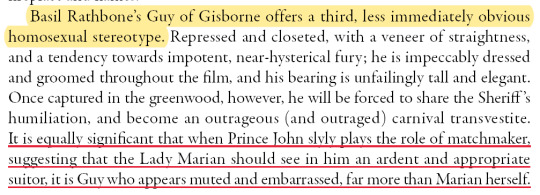
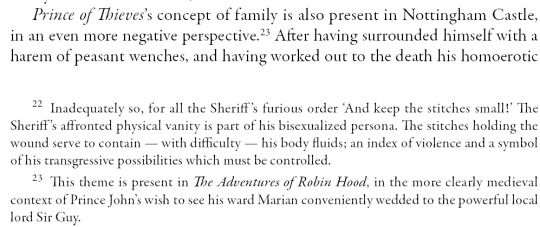

Mouvance, Greenwood, and Gender in The Adventures of Robin Hood and Robin Hood: Prince of Thieves, Brian J Levy and Lesley Coote
and with regards to discussions on the origin text (which I love and adore forever)

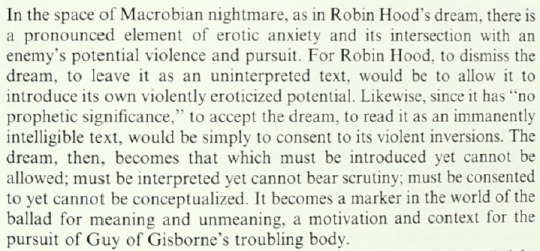
Horseplay: Robin Hood, Guy of Gisborne, and the Neg(oti)ation of the Bestial, Stuart Kane
we're. getting to the point, I promise. guy of gisborne and the sheriff in my own "adaption" are not cousins, but brothers in law (fucked up brothers in law are my thing over on my other blog. brutus and cassius? I'm there. caligula and lepidus? all over that, baby!) because I'm aiming for an adjacent transgression.
on the topic of adjacent transgressions and guy's comment in this comic about cannibalism: there's an overlap in various genres of literature, predominantly in branches of horror and tragedy: between cannibalism and incest. (additionally! a lot of texts will take on christian subtexts and allusions, so there's a bonus homoerotic cannibalism discussion happening wrt communion that I'll get into in the future) it's about. chomping. the teeth, you know.

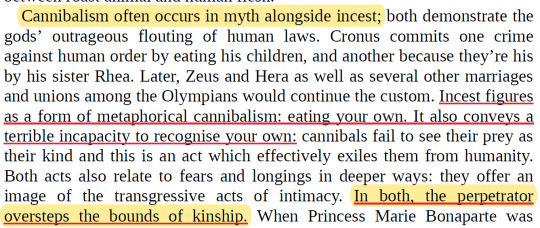
Managing Monsters, Marina Warner
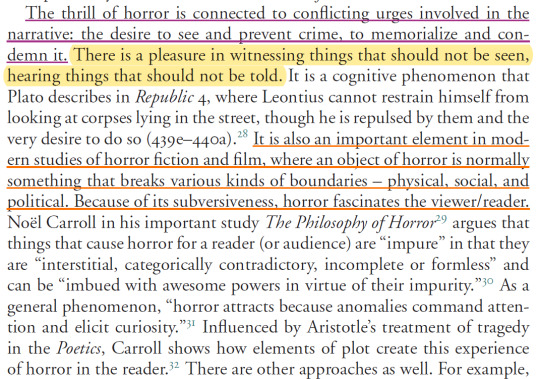
Statius and Virgil: The Thebaid and the Reinterpretation of the Aeneid, Randall T. Ganiban
there's a 100% chance I will revise the sheriff's design at some point, but I wanted to draw the flowers exploding out of the spine so bad
AND FINALLY, the neck focus on guy is half due to his fate in his origin tale (beheaded) and half my own invention: I girl-with-a-green-ribboned him. a little narrative necromancy, if you will.
#long post#outlaws in the woods tag#im sorry for how long this is and also bc its 2am but also i am not sorry. i love medieval literature and horror#the sheriff wants to crawl inside guy's ribcage and eat his lungs#he is. interestingly enough. horrified at what everyone else does to guy's body#its about possession. obsession. who else has the right to eat you etc#im going to go folk catholicism forced sainthood on guy and every second of it is going to be awful for him#i will do narrative necromancy but i will adhere to the rules of the setting and the setting is TERRIBLE#i love it! sorry guy of gisborne.#anyway you guys ever watch showtime's borgias. favorite show. so. so uh. you know that one scene. the---
462 notes
·
View notes